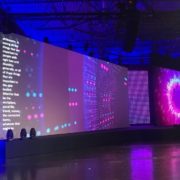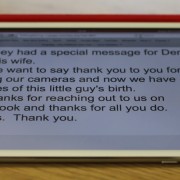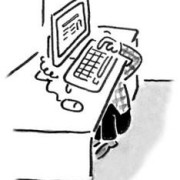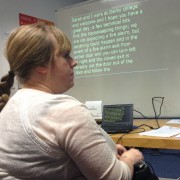Blog
The Secret to An Effective PowerPoint Presentation
/2 Comments/in Live captioning services /by Tina LanninThe pain and the pleasure of captioning telephone calls
/6 Comments/in Live captioning services /by Tina LanninGet your dream job with our remote captioning services
/0 Comments/in Live captioning services /by Tina Lannin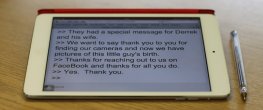
Remote captioning services are so much more than captioning provided from a different location to the event, meeting or teleconference you’re taking part in. They’re a life-changer.
Here are 5 ways the remote captioning services from 121 Captions can revolutionise your life at work.
1. Our remote captioning services keep you up to speed
Are you frustrated at not being able to understand or keep up with conference calls or meetings? With our remote captioning you don’t need to strain to hear people dialling in from train stations, or struggle to lip read the on-trend guy with the beard and moustache. Instead you can sit back, follow the captions streaming onto your laptop, smartphone or tablet and contribute just like everyone else.
2. Our remote captioning services become a contemporaneous meeting note
Another bonus with using our remote captioning services is that as soon as your call or meeting is over you’ll receive a transcription of the captioning. So you can check your understanding and recollection of the meeting and, if you’re feeling generous, share the transcription with your colleagues as a meeting note.
3. Our remote captioning services give you access to the latest thinking in your field
How many times have you looked at a conference agenda and thought, “I’d love to attend, but I won’t have a clue what’s being said”. No more! Our expert captioners can dial in to conferences and events from around the world and stream the presentations either just to you, or on the venue screens for the benefit of all delegates. What’s more, thanks to the market-leading software 1Fuzion, you can read the captions on top of any presentation slides or videos, meaning you don’t have to watch two screens at once.
4. Our remote captioning services can get you a better job
Have you always wanted to study further in your area of expertise? Perhaps an additional qualification would mean a pay rise, or the chance to get a better job? Well, now you can.
Our remote captioning services enable you to keep up with seminars, tutorials and online webinars just like anyone who doesn’t have hearing loss. And it’s so discreet your fellow students won’t be able to see the extra support you’re getting.
5. Our remote captioning services let you focus on what you’re good at
Using our remote captioning services mean that you can focus at work. No more struggling to hear. No more worrying about getting the wrong end of the stick. No more anxiety about your manager thinking you can’t do your job. Instead you can concentrate on working to the best of your ability, with the same opportunities as your hearing peers.
Book a free demo of your remote captioning services today!
Would you like the chance to focus on your job rather than your hearing loss? Get in touch today to find out how our remote captioning services can revolutionise your life at work.
Has 121 Captions changed your life? Tell us how!
 Lisa Caldwell works freelance as an accredited Phonak Roger Pen trainer with Credo Communications. You can catch up with her at credocommunications@gmail.com
Lisa Caldwell works freelance as an accredited Phonak Roger Pen trainer with Credo Communications. You can catch up with her at credocommunications@gmail.com
Captioning and Access to Work
/0 Comments/in Live captioning services /by Tina Lannin
“Access to Work tell me to use X. I prefer Y.”
“Access to Work have told me to use a typist.”
“Why don’t you get a telephone with a flashing light? It’s cheaper.”
“My Access to Work adviser says I can only have up to £xx/hour for captioning.”
Sound familiar?
Requesting funding from Access to Work can be a minefield. What are you allowed to ask for? How can you get the type of captioning service you need? What are the differences in the captioning services available and how do they work? Can I use different providers? We look at answers to these questions and more in this article.
Access to Work will grant funding according to (1) the most economical service that (2) meets your minimum needs. However, the cheapest service is not necessarily the most appropriate one; it should also adequately meet your communication support needs.
Minimum needs
If you are in a professional level job and require equal access to work with your colleagues, then you will require verbatim captioning to put you on an equal footing with them. You will need verbatim steno captioning, also known as speech-to-text, which can keep up with fast speakers. This is different from respeaking, which is not verbatim and cannot keep up with fast speech.
If you’re a lipreader and require minutes of your meeting (as a lipreader can’t lipread and take notes at the same time), or you are a sign language user, or you simply do not require a word-for-word account of what is said, you can choose specialist electronic notetaking. An electronic notetaker is not verbatim. They can write a meaning-for-meaning account of what is said, rather than word-for-word.
How different captioning services work
- Verbatim captions
Verbatim captions are provided by a speech to text reporter (stenographer or palantypist) in the UK, or a CART provider (Communication Access Real-time Translation: stenographer) in the USA. This person uses a shorthand machine. They listen and process what is said in their brain, then write words on their machine. So the accuracy comes from their brain, not the machine, just as if you’re typing. It’s not relying on software to get it right. Therefore, this service is de facto much more accurate than voice recognition software. They are able to keep up with fast speakers and write every word.
The stenographer is able to correct any words after they appear on your screen, they can just go back and edit them. Any errors will be made from hitting the wrong keys or from not having a word in their dictionary – they can then finger spell a new word.
The latency is 1 or 2 seconds which means you would be able to take part in a meeting just like a hearing person, with a very small delay. This is important for your professional reputation at work; you need to be able to keep up with your hearing colleagues.
- Non-verbatim captions
Respeaking uses voice recognition software such as Dragon. It’s not very accurate. Much depends on how well the software recognises the respeaker’s voice and translates it into English. They have to speak at a slow steady pace for the software to understand what is being said. Respeaking does not work well when there is a fast speaker in your meeting, the software just can’t keep up.
An editor is needed to correct the errors, so a respeaker and an editor work in pairs. This slows down the latency i.e. The speed at which you receive the words, to 8 seconds. It’s still inaccurate as they are relying on the software to get it right, not their brains. This may mean omitting words and sentences in order to keep up. They also can’t go back and correct a word on screen if it comes out wrong, because the end result of the process, when the words appear on your screen, is the end of the process; they have already “edited” it. You are also paying for 2 people.
This blog post explains the differences between respeaking and stenography.
An electronic notetaker will listen and write what they hear on a Qwerty keyboard, which is used with software that has shortforms added to enable them to write the gist of what is said. The notetaker, like the speech to text reporter, is relying on their brain for accuracy, not their software.
Speech to text reporters and electronic notetakers offer the client protection under NRCPD. Respeakers do not – and they do not understand deaf voices. Communication support works both ways; it benefits hearing people at work too.
Access to Work
You are allowed to choose your preferred communication support provider, providing you choose one who is the least expensive and also meets your minimum needs. The government have imposed a yearly cap on communication support of £60,700 per year; this can be used for a mix of different support needs, and rolled over from month to month.
Access to Work are not allowed to dictate which service provider you should use or how much you can spend per hour; the choice is yours to make. If Access to Work try to make you choose a provider you don’t want to use because they say they do not meet your needs, they are putting barriers in your way, and you can take your case to PHSO. The PHSO team are very experienced in dealing with deaf Access to Work clients and they understand the differences between communication support services.
As 99% of deaf people do not use sign language, your minimum need is likely to be for verbatim English, because you need to have equal access to your hearing colleagues. You need to explain why you need a verbatim service to your Access to Work adviser.
If your preference is for a summative transcription, then you need to explain your choice to your adviser.
If you’d like further advice on how to obtain the appropriate support from Access to Work, contact Darren Townsend-Handscomb at Deaf ATW, or contact us for advice on captioning support.
The benefits of on-site captioning services
/1 Comment/in Live captioning services /by Tina Lannin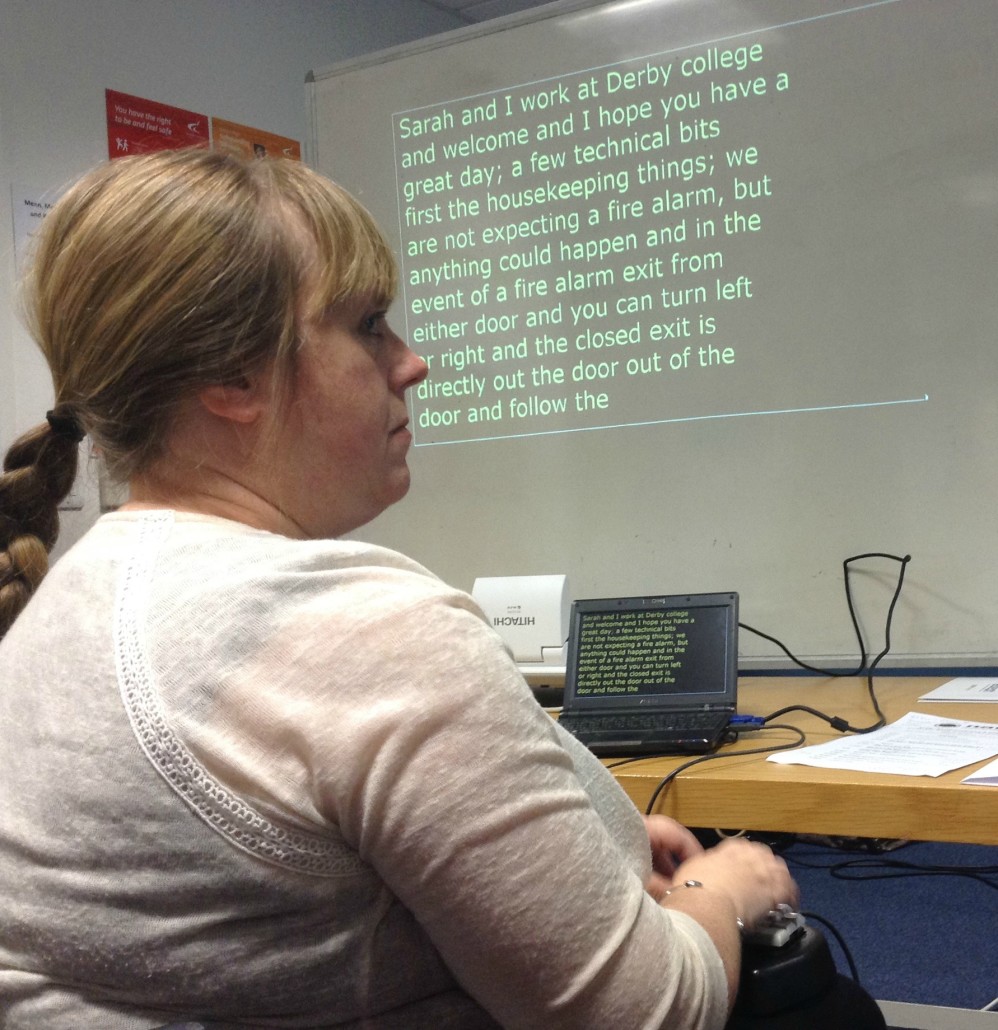
You might think we only provide remote captioning services, but we actually also provide captioning services on-site in the UK and Europe. Remote and on-site services have their pros and cons; which service will work best for you very much depends on your individual situation and preferences.
Speech-to-text reporters are stenographers or palantypists who use a shorthand machine to produce a verbatim real-time translation of what is being said, with a minimum accuracy of 98%, unlike notetaking and respeaking.
Having a captioner on-site might work better for you in some situations than having them work remotely. Here are some of the benefits of on-site captioning services provision.
- It is easier to hear what is being said if the speech-to-text reporter can see the faces of the speakers, particularly when they have an accent, are quiet speakers, or the environment is not ideal for listening. This also means it is easier for a speech-to-text reporter just to turn up and work without preparation.
- The speech-to-text-reporter can pause the meeting (with your permission) and ask people to repeat themselves for clarification. This is particularly useful when a deaf client doesn’t have the speech or confidence to do this themselves, or is unable to due to always being slightly behind everyone else when reading the live text.
- A speech-to-text reporter does not need the internet to enable the live text to be displayed. They will bring their own laptop so you can read the text from their screen. You will need to supply a comfortable chair, table, and access to a power socket.
- For events that are more than 4 hours long, you need to book two speech-to-text reporters to co-work. This means a high quality of output can be maintained for the whole day.
- Having a speech-to-text reporter in the room with you is a visual reminder that someone is working, listening and trying to take down every word that is being said. This is helpful for hearing colleagues as a visual reminder to not speak a mile a minute and to speak clearly and audibly – it’s simply good communication. I have often found myself in meetings where I or the STTR asked for a repeat, only to discover that no-one else had heard it either – yet we were the only ones who flagged this up.
- A speech-to-text reporter can plug headphones into your phone and relay your telephone calls for you.
An on-site speech-to-text reporter needs to be booked well in advance of your event, as there are so few in the UK and Europe.
Booking through us is hassle-free and gives you access to a large selection of high-quality verbatim reporters. If you think you would benefit from an on-site speech-to-text reporter, contact us.
Why deaf people love to learn a language
/1 Comment/in Live captioning services /by Tina Lannin
You might think it impossible to learn a new language if you’re deaf, but you’d be surprised!
I’m profoundly deaf and graduated with a BSc in Business with Japanese (before I received my cochlear implants). It was hard, but I would recommend anyone who wants to learn a language to give it a go.
Why bother?
Why on earth would someone who’s deaf learn a different language? Maybe because…
- If you go to a place where they don’t speak English your lipreading skills aren’t much use! Recognising word shapes in the native language can help you out.
- Learning a language isn’t just about hearing. Whether you’re deaf or not it helps to understand a menu and be sure what you’re ordering in a restaurant!
- You love a part of the world and want to immerse yourself in their culture. A friend with hearing loss is learning the South Indian dialect of Malayalam so she can talk to the little girl she sponsors there.
How to learn a language with hearing loss
How is it possible to learn a language if you’re deaf? Through live captioning.
Studies show that seeing and hearing words simultaneously improves language reading skills. That’s why language teachers recommend that their students watch foreign language films with same language subtitles where they can read along. Live captioning helps deaf people in a similar way.
Live captioning provides language support for any age and any stage
Whether a child is learning a foreign language at school, a student is learning it at university or an adult is learning it at night school, live captioning helps the student to ‘hear’ the spoken language. How does it work?
Providing live captioning for language lessons is simple:
- The teacher wears a lapel mic or has a microphone on their desk.
- The audio from the class is sent via Skype on the lecturer’s laptop or tablet to our remote captioners, ready for live captioning.
- Our captioners type what is said at up to 300 words a minute.
- The student receives those captions, word by word, on their laptop, tablet or smartphone within one second of them being spoken.
Live captioning in other languages
We recently heard about a deaf high school student trying to learn Spanish. The “live captioning” during the spoken Spanish section read “foreign language being spoken”. Not very conducive to effective learning!
121 Captions have a number of bilingual captioners, who can provide live captioning in two languages, e.g. both English and Spanish. And, if it’s a language where bilingual live captioning is not available, we provide one captioner for English, and one for the other language. Simple!
To find out more about how 121 Captions can help you learn another language through live captioning, email us on bookings@121captions.com or phone +44 (0) 20 8012 8170.
Disabled students pay tuition fees too!
/1 Comment/in Live captioning services /by Tina Lannin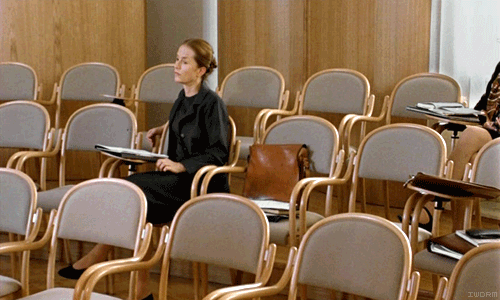
All students on the same course pay the same tuition fees, regardless of whether they are disabled or not. So it stands to reason that they should have the same learning experience, right? Wrong! Too often, students with hearing loss are left struggling during lectures, tutorials and practicals. They can end up quitting studying, or working twice as hard as their hearing peers just to keep up with their course.
Live captioning, carried out remotely, is a cost-effective and discreet way of providing the help deaf students need. 121 Captions can stream live captioning services to students’ laptops, tablets or smartphones word by word at up to 300 words a minute, ensuring deaf students hear their lectures at the same time as everyone else.
Benefits of live captioning services
Through Disabled Students Allowances (DSAs) funding live captioning in the UK comes at no additional cost to the student. And the benefits of live captioning are more far-reaching than simply receiving words on a screen; students report feeling more independent and relaxed during lectures, and less singled-out as needing extra attention.
“Without 121 assisting me, I wouldn’t have been able to fully understand my lectures as I tend to miss out when I listen. I also can’t remember things when I hear it, which makes it even more difficult. I am therefore able to remember everything I read, thus 121 also provides the transcription of the lecture at the end of the day for me to read in my own time and to study from.
[Live captioning] is one of the best services I have encountered, not only for people with a hearing disability but for anyone who needs a transcription of a class, lecture, conference or even a board meeting“. – Student A
Despite the benefits of live captioning we still hear of experiences which make us despair at the unequal education some disabled students receive:
- Universities paying post-graduate students less than minimum wage to sit in lectures with deaf students and write or type the content frantically. Without specialist live captioning training it’s inevitable that information gets missed, misspelt or garbled.
- Lecturers refusing to wear the microphones needed to pick up their lecture for live captioning.
- Colleges paying for sub-standard live captioning, which appears incomplete with sentences missing, or as chunks.
We feel all students deserve equal access to education, regardless of whether they can hear or not. Live captioning from 121 Captions provides that.
We’d love to hear from students who have had good or bad experiences with their live captioning services.
Leave a comment or get in touch on bookings@121captions.com or +44 (0)20 8012 8170.

Lisa Caldwell works freelance as an accredited Phonak Roger Pen trainer with Credo Communications.
You can catch up with her at credocommunications@gmail.com
Intersteno: The world championships
/0 Comments/in Live captioning services /by Tina LanninINTERSTENO: International Federation for Information and Communication Processing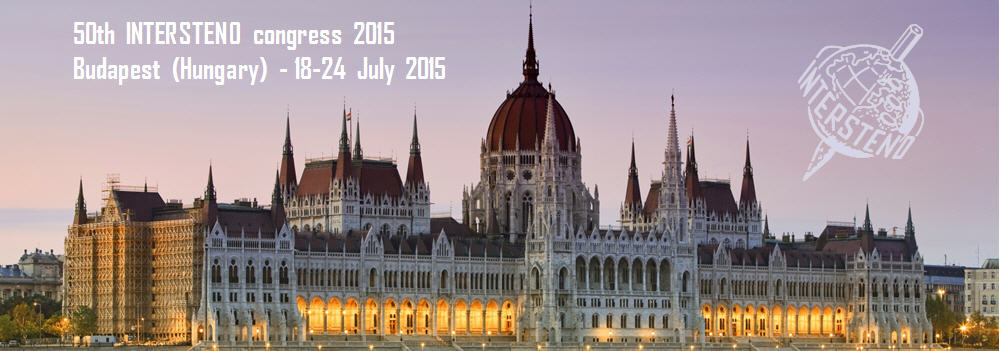
Among the 530 participants (and about 500 really on spot), 268 registered for one to seven competitions, 75 of them took part in at least 3 contests or more … so about 695 tests had to be evaluated!
Immediately after the opening ceremony in the wonderful aula of Corvinus University, an efficient logistics team managed to accommodate, within less than 2 hours, the 550-seat aula into a competition room fully equipped for 120 candidates. Sunday from 7 in the morning, competitions were run ning: text production, text correction and audio transcription in the aula; note taking and summary on the 2nd floor in classrooms divided according to the languages. The word processing contest had been planned on Saturday afternoon, just after the opening ceremony. Speech capturing contests took place on Monday morning.
Text production
The TP contest still counts the greatest number of participants (205); it happened in two shifts. Germany still provides the biggest number of congress participants and competitors but we note an increased participation of Belgium (39), Italy (37) and United States (21), and for the first time, Japanese competitors were competing in English in several contests. Most of competitors (90 %) are using a standard keyboard. The average success rate is 66 % but more than 75 % of the pupils and juniors competitors are classified, while seniors – the more crowed category – have more difficulties in reaching the high standards requested for the world championship. Success is even more difficult for competitors using a chord keyboard or speech recognition technology; the main reason being the draconian requirements concerning the maximum number of faults allowed (0,25%).
Nevertheless, Wim Gerbecks (The Netherlands), the 2015 world champion in the senior category, used a chord keyboard: the Velotype. He reached the highest score of 758,9 characters per minute, with a high accuracy (0,097 % of mistakes). The best result with standard keyboard in senior category is held by Celal Aşkın (Turkey) with 695,9 cpm and 0,029 % while Karolina Foukalová (Czech Republic) gets the 1st place in the junior category (642,3 cpm – 0,119) and Zehra Taşkale (Turkey) in pupils one (567,2 – 0,029). Fine results … but the world record of the TP-leader, Helena Zaviačičová has not yet been overtaken.
Text correction
More than 120 participants competed in TC-contest which was coordinated by Waltraut Dierks. The amazing result of the Czech senior champion Petr Hais (220 corrections in 10 minutes) can only be explained by the use of well mastered keyboard shortcuts: a technique that only a regular training can ensure. We offer as well our congratulations to the junior champion, Karolína Foukalová (160 corrections) and the pupils one, Martina Ivanova (170 corrections), both of the Czech Republic. Helped by a very efficient duo (Zendka Kundrátková and Robert Sigmund), Helena Zaviačičová managed the automatic evaluation of the text production works as well as of text correction and audio transcription ones.
Professional word processing
Seven countries have registered 63 competitors for this particular contest. The success rate is very low: 41 %, the laureates coming from 4 countries: Belgium, Czech Republic, Germany and Slovak Republic. Competitors who succeed are real professionals.
Sunday in the early morning, a 4-corrector team has managed this difficult evaluation while the leader (Georgette Sante) was busy with other duties. Many thanks to Regina Hoffman, Uwe Brüdigam, Olivier Levrau, Pieterjan Oste. Petr Hais (Czech Rep.) is the world champion in the senior category with 98 %. Congratulations are due to the junior competitor Patrik Žori, 1st place in his category, the sole successful Slovak competitor and to the very young Martina Ivanova (Czech Rep.) the unique pupil classification.
Audio transcription
This new world championship reflects the current trend in a lot of parliaments: the sessions are recorded and editors encode what they listen to. A good knowledge of the language and concepts of general culture are necessary to succeed; and excellent spelling as well. A lot of voice writers from Italy have competed with success.
The senior world champion is Gioia Pedretti (Italy); the laureate at the second place (Mirella La Rosa), the third one (Petr Hais), the junior world champion (Karolína Foukalová- Czech Rep.) reached more than 6000 points; the pupils world champion is Klára Odehnalová (Czech Rep.) with 4939 points. Francesca Marchionne, leader of the contest, managed translations and audio recordings in the best way possible so that all competitors can compete under similar conditions. The audio transcription contest was the last contest on this heavy Sunday.
Note taking and summary reporting
In order to avoid too much heat and sun in the aula, the NT contest took place just after the text correction and before the audio transcription. It happened on the 2nd floor, in classrooms with airco. A sufficiently long break permitted the candidates competing in all contests to have lunch. NT evaluates another competence often requested in parliaments and meetings: to able to take notes and make a concise report of a conference, a meeting, a debate. Helped principally by Uda Kuhn, Jan den Holder is the coordinator of this difficult contest, for which jury members have to appreciate, case by case, the exactitude of the summary. The 3 international champions come from Czech Republic: Lukáš Beránek (senior), Anna Mičková (junior) and Martina Ivanova (pupil).
Speech capturing
Almost half of the competitors use handwritten shorthand, principally German and Hungarian ones. Some competitors (Czech Republic, among others) prefer to take notes directly with the computer keyboard and word-processing software in which they have introduced shortcuts. France, Korea, USA prefer using a chord keyboard (Stenotype, Velotype, …) while a new technique is now more and more used: voice writing (the reporter dictates the text – with the help of a stenomask – to a speech recognition software which produces a transcription immediately.
The fastidious work made by the leader Jari Niittuinperä before the congress, despite his huge “normal job” is rewarded by the success of competitors: Laura Brewer (USA), 1st place in SC with chord keyboard (A15), senior, Zsuzsa Ferenc (Hungary), 1st place in graphic shorthand (A14), senior, Tori Pittman (USA), 1st place in SC in voice writing (A14), senior, Rongxin Ji (China), 1st place in SC with chord keyboard (B8), junior, Karolína Foukalová (Czech Rep.), 1st place in SC with standard keyboard (C7), junior, Alessandro Fuligni (Italy), 1st place in SC with standard keyboard (C6), senior, Klára Odehnalová (Czech Rep.), 1st place in SC with standard keyboard (C6), pupils, Erika Pekár (Hungary), 1st place in graphic shorthand (C3), junior.
Real time speech capturing
The top competence for reporters: to be able to render the transcription just at the end of the conference. A difficult exercise! Congratulations to all the competitors, successful or not, mainly to the first one in each category: John Wissenbach (USA), senior, chord keyboard; Rongxin Ji (China), junior, chord keyboard; Klára Odehnalová (Czech Rep.), pupil, standard keyboard. And thanks to Teri Gaudet which managed the competition with the help of Linda Drake and other US friends.
Source: INTERSTENO International Federation for Information and Communication Processing


